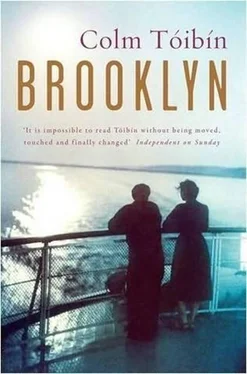Eilis woke in the night and pushed the blanket onto the floor and tried to go back to sleep with just a sheet covering her, but it was still too hot. She was bathed in sweat. This was, they told her, probably the last week of the heat; soon, the temperature would drop and she would need blankets, but for the moment it would remain muggy and humid and everyone would move slowly and wearily in the streets.
Her room was at the back of the house and the bathroom was across the corridor. The floorboards creaked and the door, she thought, was made of light material and the plumbing was loud so she could hear the other boarders if they went to the bathroom in the night or came back home late at the weekends. She did not mind being woken as long as it was still dark outside and she could curl up in her own bed knowing there was time to doze. She could manage then to keep all thoughts of the day ahead out of her mind. But if she woke when it was bright, then she knew she had only an hour or two at most before the alarm clock would sound and the day would begin.
Mrs. Kehoe, who owned the house, was from Wexford town and loved to talk to her about home, about Sunday trips to Curracloe and Rosslare Strand, or hurling matches, or the shops along the Main Street in Wexford town, or characters she remembered. Eilis had presumed at the beginning that Mrs. Kehoe was a widow and had asked about Mr. Kehoe and where he had come from, to be met with a sad smile as Mrs. Kehoe informed her that he came from Kilmore Quay and said nothing more. Later, when Eilis had mentioned this to Father Flood, he had told her that it was best not to say too much about Mr. Kehoe, who had gone out west with all of their money, leaving his wife with debts, the house on Clinton Street and no income at all. This was why, Father Flood said, Mrs. Kehoe was letting out the rooms in the house and had five other girls as lodgers besides Eilis.
Mrs. Kehoe had her own sitting room and bedroom and bathroom on the ground floor. She had her own telephone, but would not, she made clear to Eilis, take phone messages under any circumstances for any of the lodgers. There were two girls in the basement and four on the upper floors; between them they had the use of the large kitchen on the ground floor, where Mrs. Kehoe served them their evening meal. They could make tea or coffee there at any time, Eilis was told, as long as they used their own cups and saucers, which they were to wash and dry themselves and put away.
On Sundays, Mrs. Kehoe had a rule that she did not appear and it was up to the girls to cook, making sure to leave no mess behind them. Mrs. Kehoe went to early mass on Sundays, she told Eilis, and then had friends around in the evening for an old-fashioned and serious poker game. She made the poker game, Eilis noted in a letter home, sound as though it was another form of Sunday duty that she performed only because it was in the rules.
Before dinner each evening they stood up solemnly and joined their hands and Mrs. Kehoe led them in saying grace. As they sat at the table, she did not like the girls talking among themselves, or discussing matters she knew nothing about, and she did not encourage any mention of boyfriends. She was mainly interested in clothes and shoes, and where they could be bought and at what price and at what time of the year. Changing fashions and new trends were her daily topic, although she herself, as she often pointed out, was too old for some of the new colours and styles. Yet, Eilis saw, she dressed impeccably and noticed every item each of her lodgers was wearing. She also loved discussing skin care and different types of skin and problems. Mrs. Kehoe had her hair done once a week, on a Saturday, using the same hairdresser each time, spending several hours with her so that her hair would be perfect for the rest of the week.
On Eilis's own floor, in the front bedroom, was Miss McAdam from Belfast, who worked as a secretary and had least to say at the table about fashions, unless the subject of rising prices came up. She was very prim, Eilis wrote in a letter home, and had asked Eilis as a special favour not to leave all her toilet things around the bathroom as the other girls did. The other girls, on the floor above them, were younger than Miss McAdam, Eilis wrote in her letter, and had to be regularly corrected by both Mrs. Kehoe and Miss McAdam. One of them, Patty McGuire, had been born in upstate New York, she told Eilis, and was now working as Eilis was in one of the large department stores in Brooklyn. She was manmad, Eilis noted. Patty's best friend was in the basement; she was called Diana Montini, but her mother was Irish and she had red hair. Like Patty, she spoke with an American accent.
Diana complained constantly about the food that Mrs. Kehoe cooked, insisting that it was too Irish. She and Patty dressed up, taking hours to do so, every Friday and Saturday night and went out to amusements or movies or dances, any place where there were men, as Miss McAdam sourly said. There was always trouble between Patty and Sheila Heffernan, who shared the top floor, over noise at night. Sheila, who was also older than Patty and Diana, came from Skerries and worked as a secretary. When the reason for the trouble between Sheila and Patty was explained to Eilis by Mrs. Kehoe, Miss McAdam, who was in the room, interrupted to say that she saw no difference between them and the mess they made and the way they used her soap and her shampoo and even her toothpaste when she was foolish enough to leave them in the bathroom.
She complained all the time, to Patty and Sheila themselves, and to Mrs. Kehoe, about the noise their shoes made on the stairs and the floor above.
In the basement with Diana was Miss Keegan from Galway, who never said much, unless the talk turned to Fianna Fáil and De Valera, or the American political system, which it seldom did, as Mrs. Kehoe had, she said, a complete revulsion of political discussion of any sort.
The first two weekends Patty and Diana asked Eilis if she would like to come out with them, but Eilis, who had not yet been paid, preferred to stay in the kitchen until bedtime even on the Saturday nights. And on her second Sunday she had gone for a walk on her own in the afternoon, having made the mistake the previous week of going with Miss McAdam, who had nothing good to say about anyone and had sniffed her nose disapprovingly if anyone passed by them who she thought was Italian or Jewish.
"I didn't come all the way to America, thank you, to hear people talking Italian on the street or see them wearing funny hats," she said.
In another letter home Eilis described the system they had at Mrs. Kehoe's for washing clothes. Mrs. Kehoe did not have many rules, Eilis told her mother and Rose, but they included no visitors, no dirty cutlery or cups and saucers left lying around and no washing of clothes of any sort on the premises. Once a week, on a Monday, an Italian woman and her daughter from a nearby street came to collect the washing. Every boarder had a bag, and a list had to be attached of what was in the bag, which would then be returned with the washing on Wednesdays with a price at the bottom that Mrs. Kehoe would pay, to be reimbursed by each boarder when she came home from work. They would then find their clean clothes hanging in their closets or folded and placed in the chest of drawers. There would also be clean sheets on the beds and fresh towels. The Italian women, Eilis wrote, ironed everything beautifully and put starch into her dresses and blouses, which she loved.
She had dozed for a while and now she woke. She looked at the clock: it was twenty to eight. If she got up immediately, she thought, she would reach the bathroom before Patty or Sheila; Miss McAdam would, she knew, have already gone to work by now. She moved quickly to the door and across the landing with her toilet bag. She wore a shower cap because she did not want to destroy her hair, which became fuzzy when it was washed in the water of the house as it had on the ship and took hours then to comb out. When she got paid, she thought, she would go to the hairdresser's and have it cut shorter, made more manageable.
Читать дальше












